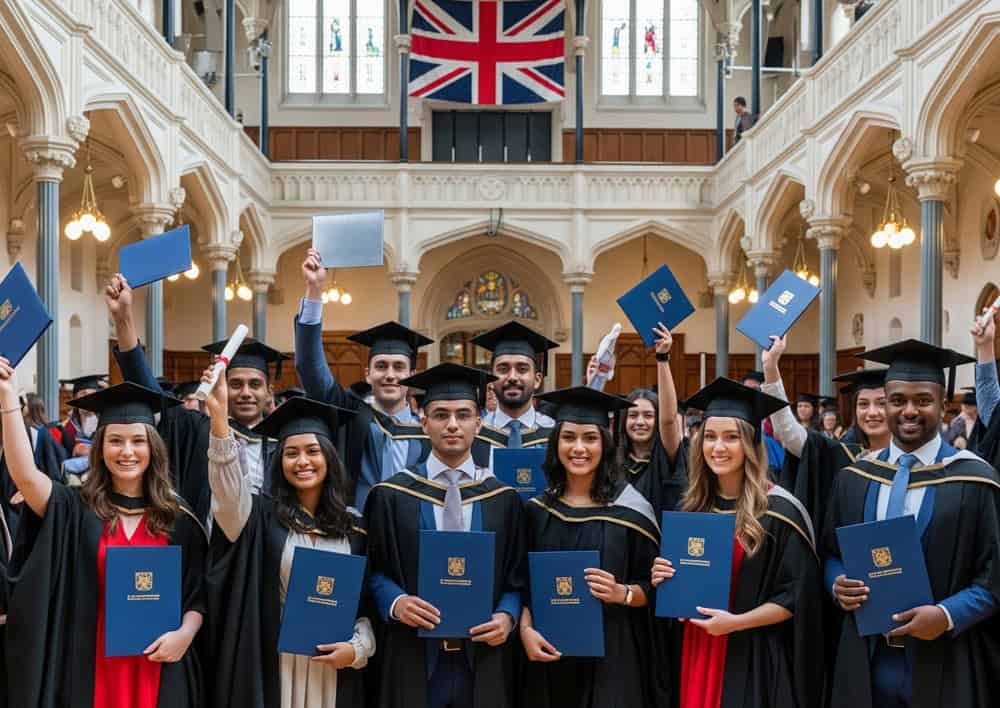So, you’re thinking about doing a master’s degree in the UK? Well, that’s awesome!
We understand that you have your own reasons for it. For instance, you might be looking to boost your career, dive deeper into your field of study, or just experience life in one of the world’s best educational countries.
So, whatever the reason may be, this guide will walk you through everything you need to know.
Specifically, we will share with you all the relevant details that are essential for you to complete your master’s degree in the UK.
Table of Contents
ToggleWhy Study a Master’s in the UK?
Let’s start with the big question: why you must choose the UK for your postgraduate studies?
Well, for starters, the UK is home to some of the best universities in the world.
Think of:
Whereas these universities are globally recognised for their academic excellence.
But it’s not just about the prestige. A master’s degree in the UK is typically shorter than in many other countries.
Speaking of which, most programs last just one year.
This means you can save your time and money while still getting a world-recognised education.
Plus, the UK allows students to select a program from a diverse range of courses.
Therefore, whether you’re into engineering, business, arts, or even a major like marine biology, you’ll find a program that fits your interests.
Types of Master’s Programs in the UK
When it comes to master’s degrees, the UK has a lot to offer.
For instance:
- Master of Arts (MA): These are usually research-based and focus on the humanities and social sciences.
- Master of Science (MSc): More common in STEM fields, these programs often include coursework and a dissertation.
- Specialised Degrees: Such as Master of Fine Arts (MFA), Master of Laws (LLM), and more.
- Master of Business Administration (MBA): Perfect for those who are looking to climb the corporate ladder or start their own business.
- Master of Research (MRes): If you’re keen on research, this one’s for you. It’s heavily focused on independent study.
Eligibility Requirements for UK Masters
Before you get too excited, let’s talk about what you’ll need to apply.
First of all, you’ll need a bachelor’s degree.
As in most universities, look for a 2:1 or equivalent, but don’t panic if yours isn’t perfect.
This is because some schools are flexible, especially if you have relevant work experience.
The next thing that you must consider is your English language proficiency.
Speaking of which, if English isn’t your first language, you’ll likely need to take an IELTS or TOEFL test.
Moreover, some programs may also require work experience, letters of recommendation, or a personal statement.
Note: These things depend on the course, so always double-check with the requirements for your chosen program.
Step-by-Step Process to Apply for a Master’s Degree in the UK
Alright, now we’re getting to the good stuff—the actual application process.
Let’s break it down step by step.
1. Choose Your University and Course
Choosing the right university and course is like picking your next big adventure, as it sets the tone for everything that follows.
Therefore, start by thinking about what you really want.
For instance:
Are you looking for a program that’s research-heavy or more practical? Or do you want to study in a busy city?
Trust us, these questions matter because they’ll shape your entire experience.
Also, consider referring to university websites, global rankings (like QS or Times Higher Education), and student forums to get a feel for different programs.
Finally, check out the type of support the university offers to international students.
As in some schools have dedicated teams to help with visas and accommodation.
2. Check Entry Requirements
Once you’ve got a shortlist of universities and courses, it’s time to dig into the crucial part: which is the entry requirements.
Remember that every program has its own set of criteria, so don’t assume they’re all the same.
Speaking of which, for most master’s programs, you’ll need a bachelor’s degree in a related field.
With that being said, some will specify a minimum grade (like a 2:1 or equivalent), while others might be more flexible if you have relevant work experience.
On the other hand, if you’re an international student, you’ll likely need to prove your English language proficiency.
Whereas this usually means taking an IELTS, TOEFL, or PTE test.
In addition to that, some programs might also ask for additional materials, like a portfolio (for creative courses) or a writing sample (for research-based degrees).
Note: If interviews are part of the process, start preparing early. Practice answering common questions and think about how to explain why you’re passionate about the course.
3. Prepare Your Documents
This step is where the real work begins.
Preparing your documents might feel tedious, but trust us, it’s worth doing it right.
Here’s a closer look at what you’ll need:
- Academic Transcripts: These are official records of your previous education. Make sure they’re up-to-date and translated into English if necessary. Some universities might ask for certified copies, so check their guidelines.
- Personal Statement: Think of this as your chance to tell your story. And be specific in every part as in why do you want to study this course? How does it fit into your career goals? And what makes you a great candidate?
- Letters of Recommendation: These should come from people who know you well academically or professionally. Professors, supervisors, or mentors are ideal. Give them plenty of time to write the letter and provide them with details about the course and why you’re applying.
- Proof of English Language Proficiency: If required, make sure your test scores meet the university’s minimum requirements.
- CV/Resume: Some programs might ask for this, especially if they value work experience. Therefore, highlight any relevant skills, jobs, internships, or volunteer work if you have.
4. Submit Your Application (UCAS/Postgraduate Portal)
Now comes the moment of truth: submitting your application.
In this case, most UK universities use their own online portals for postgraduate applications, although some may use UCAS for specific courses.
Speaking of which, the process is quite simple, but here’s how to make it smooth:
- Create an Account: Start the process by setting up an account on the university’s portal.
- Fill Out the Form: Carefully fill in all the required fields. Pay attention to details such as spelling, grammar, and formatting.
- Upload Documents: Make sure all your files are in the correct format (usually PDF) and named clearly (e.g., “PersonalStatement_JohnDoe.pdf”). Whereas this makes it easier for the admissions team to review your application.
- Double-Check Everything: Before submitting, go over the form one last time.
Pro tip: Apply early! Universities often operate on an admissions basis, which means they assess applications as they come in.
5. Receive Your Offer Letter
After submitting your application, it’s time to sit back and wait.
We know that this part can feel like forever, but try to stay patient.
This is because most universities aim to respond within a few weeks, though it can take longer during busy periods.
On the bright side, when your offer letter arrives, be sure to celebrate it! But don’t pop the champagne just yet.
The reason for that is offers can be conditional or unconditional.
To put it simply, a conditional offer means you still need to meet certain criteria, like achieving a specific grade or passing your English test. While an unconditional offer means you’re all set (yay!).
Moreover, if you receive multiple offers, take your time to decide.
For instance, you could consider factors such as course content, location, and financial aid.
With that, once you’ve made your choice, reply promptly to secure your spot.
Note: Missing the deadline may result in losing your place.
However, in the worst-case scenario, if you are waitlisted or rejected, don’t stress out.
This is because you can reach out to the admissions team for feedback. And work according to their advice.
6. Apply for a Student Visa
If you’re an international student, the next step is to apply for a student visa.
However, in the UK, this is called as the Student Route Visa (formerly Tier 4).
So, here’s how to tackle it:
- Prepare Your Documents: You’ll need your offer letter, proof of funds (to show you can support yourself), and your CAS (Confirmation of Acceptance for Studies) number from the university. Plus, make sure your passport is valid too.
- Pay the Fees: There’s an application fee and a healthcare surcharge payment (which gives you access to the NHS). Budget for these costs in advance.
- Attend a Biometric Appointment: As part of the process, you’ll need to visit a visa application center to provide fingerprints and a photo. Book this appointment as soon as possible, as it can get busy.
- Wait for Approval: Once you’ve submitted everything, it’s another waiting game. In this case, processing times may depend, so plan accordingly.
7. Arrange Accommodation & Finances
Let’s break it down:
- Accommodation: Many universities offer on-campus housing, which is convenient but can fill up fast. Therefore, apply early to secure a spot. On the other hand, you can rent rooms or share a flat with other students as well.
- Budgeting: Living in the UK can be expensive, especially in cities like London. So for that, create a detailed budget by covering tuition, rent, groceries, transportation, and entertainment.
- Scholarships & Part-Time Jobs: Look into scholarships offered by the university or external organisations. This is because even a small award can make a big difference. Additionally, many students work part-time to support their income. Anyway, just make sure you understand the rules around when working on a student visa.
Important Deadlines for the UK Master’s Applications
You must always manage the time when it comes to applying for a master’s degree, just like in other cases.
With that being said, most universities have deadlines between January and March for courses starting in September.
However, some popular programs might close applications earlier due to high demand.
Therefore, it is best to refer to the timeframes of your chosen university.
Note: If you’re applying for scholarships, be sure to check those deadlines as well, as they’re often even earlier.
Tips for a Successful Application
Here are a few points to help you stand out:
- Specify your personal statement for the course. Show them why you’re passionate about the major and how it fits into your career goals.
- Get strong references. Choose people who know you well and can vouch for your skills and dedication.
- Proofread everything. Typing mistakes and grammatical errors can make a bad impression.
- Be natural. This is because Admissions teams can spot unrealistic application details a mile away.
- Remember, your application is your opportunity to stand out. So make it count.
Common Mistakes to Avoid
Let’s talk about some downfalls you must avoid:
- Applying late: This is a silly mistake. As late applications often get overlooked, especially for competitive courses.
- Ignoring entry requirements: If a course asks for specific qualifications, make sure you meet them.
- Rushing your personal statement: This is your chance to tell your story. Therefore, take your time and make it compelling.
- Not checking visa rules: Missing this step can cause major issues when reapplying.
Applying for a master’s degree in the UK might seem overwhelming at first, but trust us, it is not complicated if you know the process.
Therefore, use this guide to break it down into manageable steps, try to be organized, and don’t hesitate to ask for help when you need it.
Remember, this is an exciting journey, not just a list of tasks to complete.
So take a deep breath, focus on your goals, and get started. You’ve got this!
Contact TEVS a UK student visa consultants in Sri Lanka for more details.
FAQ
You’ll need a bachelor’s degree, proof of English proficiency (such as an IELTS band score), and sometimes work experience or letters of recommendation.
It depends. If English isn’t your first language, you’ll likely need IELTS or another approved test. On the other hand, some universities waive this if your previous degree was taught in English.
From start to finish, it can take 2-3 months. But visa processing and accommodation arrangements might add extra time.
Yes, many programs don’t require work experience. However, some specialised courses (like MBAs) might prefer it. Therefore, always check for the specific requirements.
Suggested Reads:







